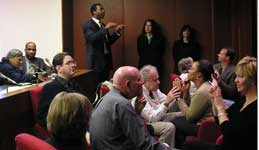February 13, 2006
GA Activist Work For First Deaf-Blind Specific Legislation
A report from Richard LeMoine Wright.
Leaders in Georgia's deaf-blind community have struggled for equality for many years. Major progress was achieved last winter with the introduction of Senate Bill (SB) 248, the first legislation in Georgia history designed to specifically meet the needs for services for deaf-blind Georgians. If it becomes law, SB 248 would establish services that would assist with providing much needed technical assistance, training and resources for people who are deaf-blind.

Deaf-blind activists at the Georgia Capital. |
The Georgia Senate reconvened last month. Georgia's Governor's Council on Disabilities hosts "Disability Day at the Capital" on Thursday, February 23, 2006.
If ever your help was needed to support this vital legislation, the time is now.
SB 248 contains powerful language because deaf-blind, blind and deaf activists were heavily involved in its creation. The bill calls for services that empower deaf-blind people to achieve "maximum independence and employment for individuals with both a hearing and a vision loss." The bill also addresses the issues that face deaf-blind youth, with an emphasis on the need for transition "from education to the workforce."
The bill calls for implementation of a statewide coordinator for "support service providers" -- SSPs. This coordinator would be responsible for educating communities across Georgia about the need for SSPs, as well as recruiting and training individuals to become SSPs. The bill would also provide for three other positions: one for education in the community, one for education in governmental agencies, and one for administrative support. All four new positions would work together as a team to coordinate, train and assist Georgia communities in becoming more accessible to deaf-blind Georgians.
Initially, SB 248 was referred to the Senate Insurance and Labor Committee for review, the first stage in a lengthy process. The I & L committee began meeting again in January 2006. If the bill is successfully reported out of the committee, its next stop will be the state Senate.
Susan Lascek of the Helen Keller National Center says that, now that SB 248 is written, read and referred to committee, it is crucial to get support for it in the Georgia General Assembly. "There are so many places that a bill like this can be held up," said Lascek. "To insure its passing, we need citizens to be aware of SB 248 and rally in support."
The authoring Senator, the Hon. Regina Thomas of Savannah, was recognized in 2005 by the Georgia Association of the Deaf-Blind during GADB's 11th Annual Helen Keller Deaf-Blind Awareness Event for her support and participation in SB 248. In her remarks at the event, Senator Thomas also encouraged concerned citizens to contact their legislators in support of SB 248.
At the 2005 Disability Day at the Georgia state capital, 18-year old deaf-blind activist Virginia Jordan emphasized that deaf-blind people are simply seeking better opportunities to become involved in society. "Deaf-blind people do want to work," she said. "We want to give back to the community. Passing SB 248 will help us become more independent by giving us a better chance of getting and keeping a job, along with many other opportunities." Jordan was not able to stay in Georgia to support SB 248; she began college at Gallaudet University in the fall. She says she "will be praying" for SB 248 to become a fully-funded law. She's encouraging every Georgian she knows to offer their active support.
Deaf-blind activist Mark Gasaway offers similar thoughts from his years working for equal rights for deaf-blind individuals. "It is vital," said Mark, "that the deaf-blind community is surrounded by supporters from all other disability communities; we must unite to let our legislators know that we support each other in our endeavors to make change happen. This deaf-blind legislation is necessary not only for those who are already experiencing deaf-blindness but for everyone who may develop signs of deaf-blindness later. Contacting your legislators is very, very important."
Visit Georgia's legislative website for information on SB 248. Send an email of support to Ralph Hudgens, Chair of the Insurance & Labor Committee, at ralph.hudgens@senate.ga.gov
Richard LeMoine Wright edits Focus, the quarterly newsletter of the Georgia Registry of Intepreters for the Deaf.
Posted on February 13, 2006